Article by Isis Calderon
Taiwan’s annual pride event was celebrated last month on October 29. It was an extraordinarily colorful event that took over Taipei’s center, with around 120,000 participants, according to the event organizers. Pride of the present year was exceptional; after two years of being on hold for the COVID-19 pandemic, people from all over the world attended the event to walk along the 20th annual Taiwan LGBT+ Pride parade, which set off from Taipei City Hall Plaza and headed down Ren'ai Road.
Extraordinary performers, international and national students, companies, political groups, and citizens of all ages got together on the 29th to march along the Pride Parade in Taipei – Pride month in Taiwan is a vital time for retrospection, a time not only for celebration but for raising questions and criticisms, acknowledging landmarks, and looking forward to a better future.
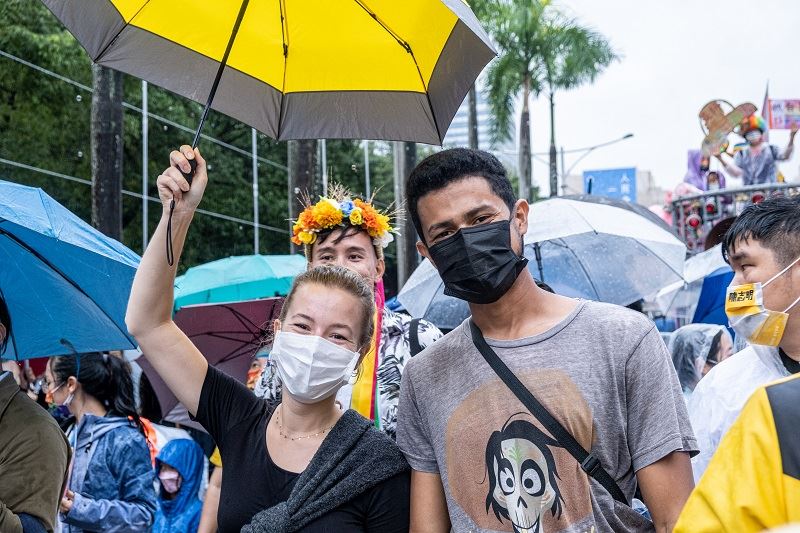
▲International students at the Pride Parade 2022
Photo credit: Isis Calderon
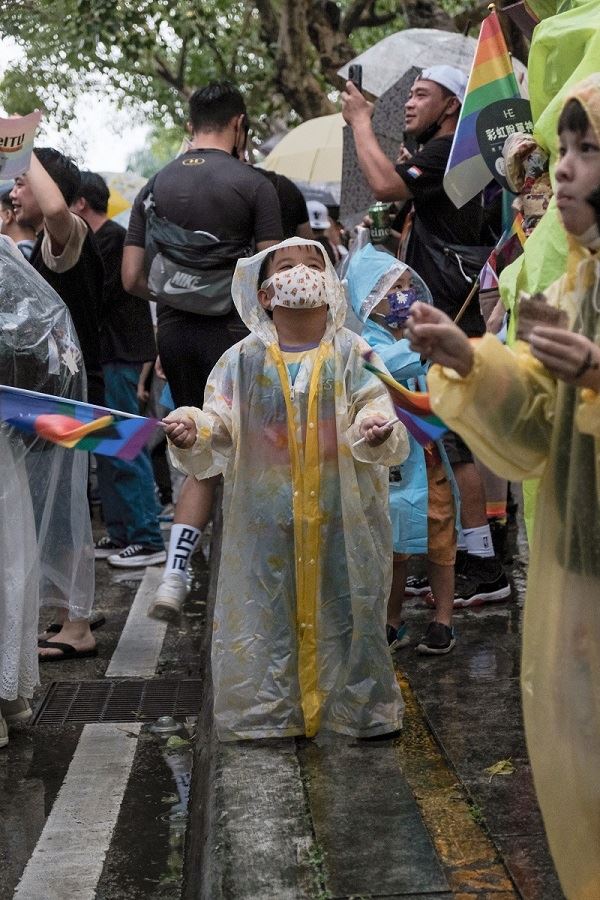
▲A kid joins the parade from the sidewalk as he waves LGBTQ+ flags with excitement.
/ Photo credit: Isis Calderon
Reflecting on history, from the banning of conversion therapy and the implementation of anti-discriminatory laws to the right to change one's legal gender and the recognition of same-sex couples, Taiwan is at the forefront of LGBTQ rights in Asia.
Its current leading position in the East and Southeast Asian region in queer politics comes from years of activism, lobbying, and organization from the island’s queer and advocacy groups.
Taiwan’s LGBTQ+ landmarks and movement
Many crucial events have led to the transformation of Taiwan into the “most progressive place in Asia for gay rights." Among the earliest and most fundamental, we can mention the establishment of the Taiwan Tongzhi Hotline Association in 1998, Taiwan's first legally registered LGBTQ organization, which has since then provided the LGBTQ community with peer counseling, support networks, and a community resource center; later on, in 2003, the drafting of a human rights law that included an article on same-sex marriage and adoption rights for same-sex couples, which although it did not pass, was a major step towards the development of the movement.
Moving on to the most recent and significant step toward equality, the legalization of same-sex marriage in 2019, Taiwan remains the first and only country in Asia to legalize same-sex unions, with over 6,000 unions registered as of September 2022, earning Taiwan international recognition as the most progressive place in Asia for LGBTQ+ rights.
The overall view of the LGBTQ+ community has also changed throughout the years, progressively gaining acceptance and representation, with more than 60% of individuals saying they support same-sex marriage, up from just 37.4% before same-sex marriage became legal., according to a poll conducted by the Executive Yuan’s Press Office in 2021.
A promising future
Taiwan's international recognition of openness and diversity reached such a high level that it was granted the right to host the WorldPride, which would have taken place in Kaohsiung City in 2025. A huge honor indeed, given that the event had the potential to foster new and long-lasting ties between Taiwan-based and foreign pride organizers, including those in nations in South, East, and Southeast Asia, allowing Taiwan to once again be in the spotlight for international queer politics. The event, however, was canceled earlier this year due to complex political reasons and differences of opinion between the many event organizers. But the reasons that allowed Taiwan to be nominated as the WorldPride host remain in place.
Still, behind the fair—and internationally recognized—narrative of acceptance and tolerance, we mustn't get complacent. There is always room for criticism, as this is an ongoing battle, and there are still many things to work on.
Leon Wong, head director of the Lu Ren Jia society of National Chengchi University NCCULRJ 政治大學陸仁賈社 – An LGBTQ+ advocacy student society – comments that no matter if the law has recognized same-sex marriage, and even if the island is regarded as the most open in Asia, there are still many ways of discrimination towards the community.
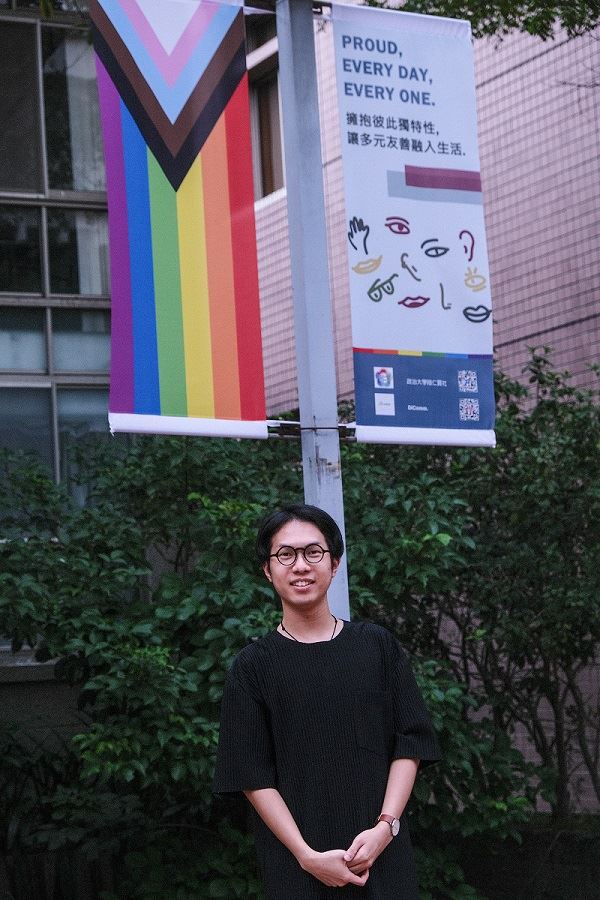
▲Leon Wong, head director of 政治大學陸仁賈社
stands in front of LGBTQ+ flags installed at NCCU / Photo credit: Isis Calderon
NCCULRJ was established in 1995 and has been working relentlessly and nonstop for the advocacy of gender issues, transgender issues, and the feminism movement, too, Leon says. When asked about why associations like this one are important, Leon speaks from his own experience of looking to identify with other like-minded individuals and spreading education about gender and queer issues.
The association also makes sure to hold lectures about relevant topics at National Chengchi University and serve as advocates within NCCU and as representatives of the university at events outside the campus.
As previously stated, mass organizations as well as the establishment of associations have forged the path for the movement; equally important are the ongoing educational programs being implemented at the national level. With this in mind, the Taiwan Tongzhi Hotline Association, the Awakening Foundation, and Taiwan Gender Equity Education Association have formed an alliance: the Gender Equality Education Coalition, which seeks to promote gender equality education implementation at all levels and allow children to embrace their own sexual identity in a safe space.
The future looks bright for the community in Taiwan - and although there are still palpable generational and ideological divides regarding the movement - activism, and organization (at the student and higher levels) never stop. The path is long, and there is much to look forward to.
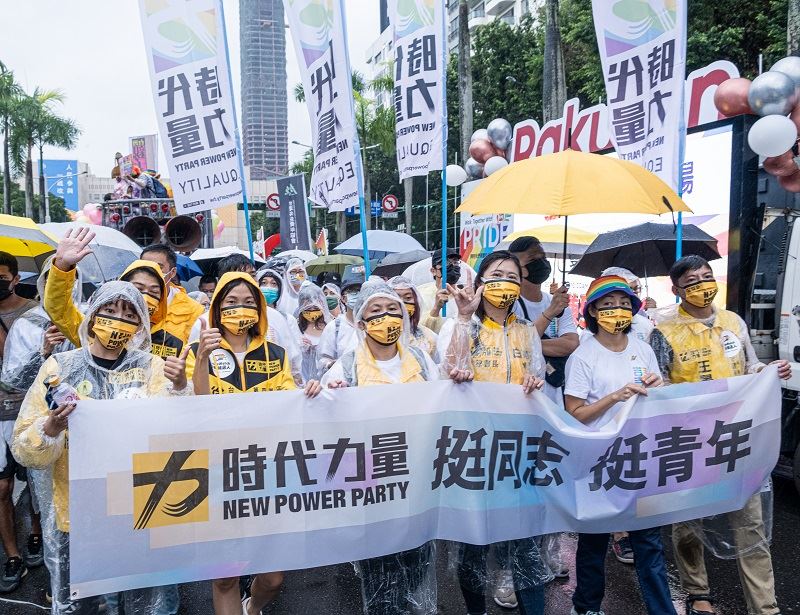
▲New Power Party (NPP), a political party that emerged in 2015 after the sunflower movement,
is spotted at the Pride Parade. The NPP advocates for universal human rights, and civil and political liberties.
/ Photo credit: Isis Calderon
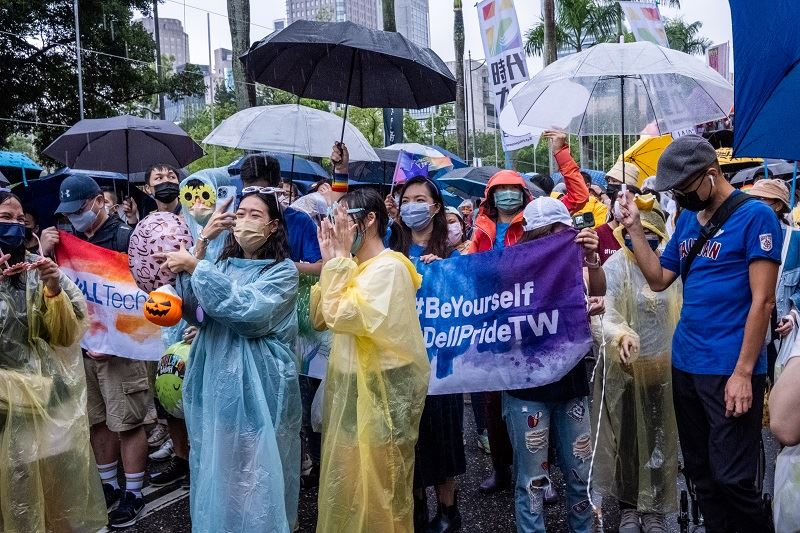
▲Groups of civil society walking at the Pride Parade joyously under the rain
/ Photo credit: Isis Calderon
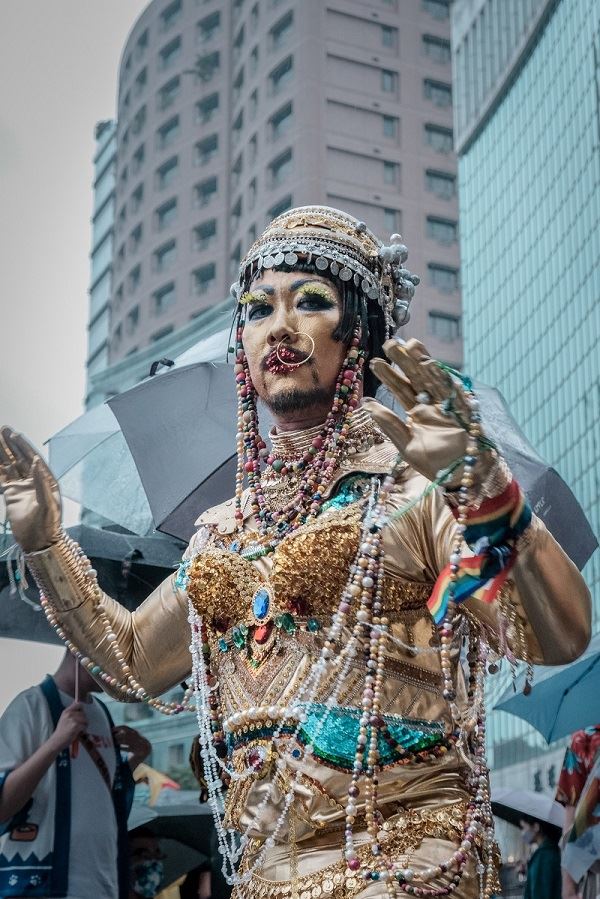
▲A performer poses for the camera while displaying their costume for the Pride Parade.
/ Photo credit: Isis Calderon